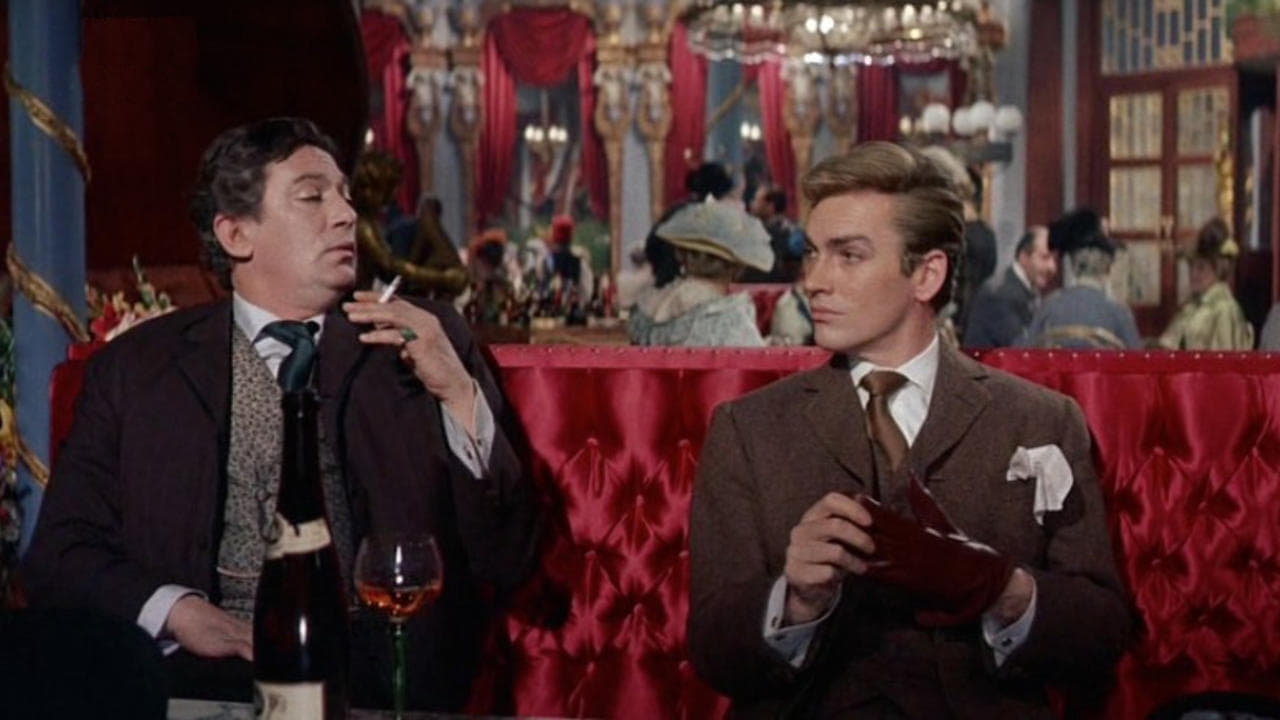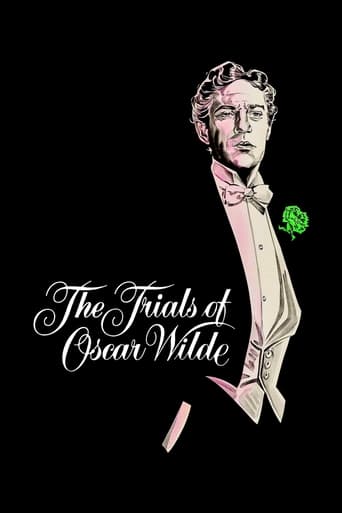



Purely Joyful Movie!
Just perfect...
It's fun, it's light, [but] it has a hard time when its tries to get heavy.
View MoreIt really made me laugh, but for some moments I was tearing up because I could relate so much.
View MoreThe portrait of a world more than the image of a great writer. the motif - the subtle, fine performance of Peter Finch and the chance to have as partner Lionel Jeffreys. because the purpose is not only to give a film about errors or sins or judgement but about the spirit of a world, looking to give to appearences the lead importance. it is not the picture of a victim but the exploration of the mechanism of a society. that could be the motif for who you feel the work of Peter Finch as more than the exposure of Oscar Wilde life traits. it is a proposition for understand. the forms and rules and expectations of a world defined by strong rules . and an existence less than idealistic you imagine. but loyal, too loyal to his principles. a must see film. for performances, for story. and, maybe, for the subtle moral behind the first impressions.
View MoreFirst of all I like the way the authentic witticisms of Oscar Wilde have been woven into the script. His sarcastic and pointed remarks derived from a keen observation of the morals, pomposity and hypocrisy of late Victorian England make for intelligent and amusing dialogue between the characters.Peter Finch (Oscar Wilde) delivers lines with a certain flourish, but I think he could be even more flamboyant for such a man was Wilde. John Fraser plays the moody Bosie as Oscar's current lover with a balanced mixture of effeminate charm and petulance. Best acting role is that of Lionel Jeffreys as the Marquis of Queensbury. Make no mistake his character comes through loud and clear. He gives a remarkable portrayal of his utter disgust when his 21 year old son Bosie defies him and continues his relationship with Oscar, a man of middle age and married. All London is gossiping and there is much clicking of tongues. Mrs. Wilde played by beautiful Yvonne Mitchell stands by in utter dismay and disapproval.The courtroom scene gives Oscar the opportunity to deliver more witty lines and to describe his inner feelings about true love...interesting because one is not too sure what he is about to say next. One gets the feeling that Oscar has chosen the path of self-destruction...or is he just being his theatrical self?After he does his prison sentence with hard labour he is supposed to look tired and ill, but I fail to notice much of a change in his demeanour. He should be much paler with a worn down look. This would command more sympathy. Oscar's sexual adventures around the streets of London are not discussed to any extent nor portrayed in this film. If they had been given more prominence we would perhaps have felt justified in agreeing with the jury's decision. As it is , the sordid details of his sexual encounters are played down and because the film is presented in this way we feel rather sad that this great playwright both loving and generous should suffer so much at the hands of those who tried to destroy him.
View MoreOne never quite believes the character given a rather masculine portrayal by Peter Finch is involved in a love affair with the young Lord Alfred Douglas, but the tentative treatment of the film's subject matter is understandable since homosexuality was still illegal in Britain at the time of its release. More importantly, however, is how effectively the film relates the story of a man who is ruined by a society which can be so hateful. Although Wilde is portrayed at first as an arrogant and indulgent celebrity, as his love for his family and his torn loyalties are revealed it becomes hard for one to feel no sadness as he is made to pay with public disgrace and a jail sentence. John Fraser is perfectly cast as the spoilt and manipulative Douglas.
View MoreThe relationship between Oscar Wilde and Bosie, has already developed and is in full flow when this film begins, so we are almost immediately immersed into the war of hate between Bosie and his homophobic and severely disapproving father. Bosie's father appears to disapprove of his son merely because of his son's lack of manliness, and despises Oscar Wilde because of what he perceives as Wilde's role in perverting his son. But the resentment is also clearly due to the fact that Bosie's father just cannot connect with his son on any level (well portrayed in this film) and it is Wilde that appears to steel that genuine place in Bosie's heart. This just eats away at Bosie's father, and so he attempts to destroy the relationship between Bosie & Wilde in any way he can. But the more he tries, the more he pushes his son away, into the arms of Wilde.Peter Finch plays Oscar Wilde admirably and he convinced me that this could have been the real Oscar Wilde. John Fraser plays Bosie acceptably - although i think it's his clean 'nice boy' looks that help him pull this role off more than his acting talent. Bosie's father, the Marquis of Queensbury is played by Lionel Jeffreys and he displays the cantankerous side of the character well. The courtroom scenes could have been tenser, and i dont think James Mason (as one of the barristers) delivers his lines with quite the same passion of some barristers I've seen. It is in one of the courtroom scenes, that quite apart from his relationship with Bosie, the true extent of Wilde's promiscuity with regard to young men is exposed, which was the one point for me in the film that I felt slight disgust at Wilde, although his promiscuity still didn't justify in my opinion what then happened to him. I'm just glad that society has become more tolerant nowadays, in some parts of the world.The film is approximately two hours long, is packed with Oscar Wilde witty one liners, which made the film very funny at times. On second viewing, the film was even more enjoyable. Shot in 1960, I watched it for the first time here in the UK on Monday 7th Jan 2002 on Channel 4 who played it as an afternoon matinee, and the quality of the copy they played was superb - crystal clear. All in all, the film was a joy to watch. I would highly recommend it, as it illustrates the relative intolerance of the times in England at that time. There are no sensual scenes in the film, so its 'safe' to watch for everyone. I say this because I know that a friend of mine recently stopped watching the latest Oscar Wilde film (with Stephen Fry, released 1997) as soon as he realised that it contained some male nudity & stuff, which he said he was personally uncomfortable with. And the 1960 film doesn't lose anything for not having any sexual stuff in it, believe me. Please watch it, if you get the chance.
View More